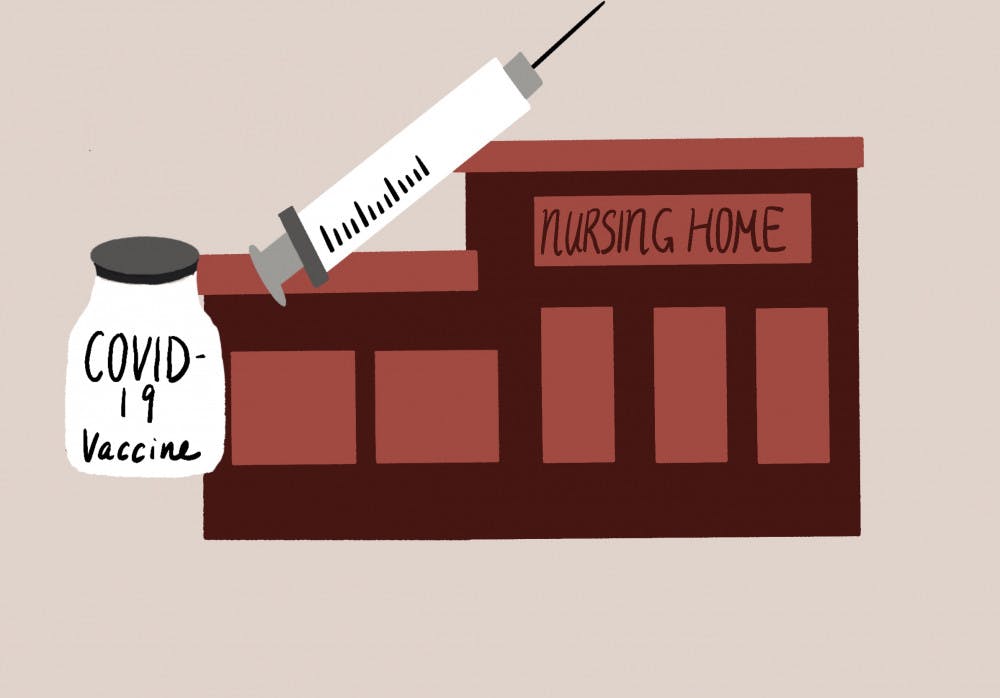A University researcher is leading a national effort to track vaccine adverse events in nursing home residents who have received the COVID-19 vaccine. Vaccine adverse events are health issues that arise following inoculation with a vaccine; these events may be caused by the vaccine itself or be completely coincidental, according to the Centers for Disease Control and Prevention. The research is funded through a National Institute on Aging grant awarded to the University last November.
The research team includes Principal Investigator and Professor of Health Services, Policy and Practice Vincent Mor and collaborators at Genesis HealthCare, the CDC, the Rhode Island Quality Institute and CVS Health.
“Vaccines are highly regulated and even after establishing safety in large clinical trials, undergo long term post-licensure monitoring to gauge any adverse event,” wrote Lalit Beura, assistant professor of molecular microbiology and immunology, in an email to The Herald. As the number of vaccines that target infectious disease increases, the potential for vaccine adverse events also increases, he wrote. Beura, who is not involved in the study, added that scientists engage in vaccine tracking studies to establish causality of adverse events through clinical evidence and epidemiological studies.
In the race to develop and approve COVID-19 vaccines, data from elderly residents in nursing homes were missing from the clinical trials, said President and CEO of the Rhode Island Quality Institute and Associate Professor of Medical Science Neil Sarkar.
“This project focused on looking at people in skilled nursing facilities and building a system for monitoring any adverse events that might be associated with vaccination,” he said. Sarkar and his team at RIQI were responsible for designing and evaluating the adverse event detection algorithm. Distinguishing between adverse events caused by the vaccine and typical health problems in elderly patients made this vaccine monitoring effort more challenging, Sarkar said.
The researchers created algorithms that look at specific codes that are part of an identification system used to track health care statistics in order to analyze data for the monitoring system, said Barbara Bardenheier, one of the project’s investigators and assistant professor of health services, policy and practice.
The data analyzed by this algorithm comes primarily from Genesis HealthCare, the largest national nursing home operator. With approximately 86 percent of its nursing residents already vaccinated, Genesis is tracking COVID-19 vaccine adverse events and “feeding that data to Brown University every night,” wrote Genesis Chief Medical Officer Richard Feifer ’88 in an email to The Herald.
“This is unquestionably the biggest vaccination effort ever undertaken,” he added.
Elizabeth White, investigator in the Center for Gerontology and Healthcare Research at the School of Public Health and University leader of the Brown-Genesis collaboration, said the goal of having a “real-time data infrastructure … (was) to understand multiple aspects of (COVID-19 vaccines) in nursing homes.”
As a result of this partnership, the team has “already published numerous original peer-reviewed research studies on COVID-19 in nursing homes … with many more in the pipeline,” Feifer wrote.
The nightly data exchanges between the University and Genesis result in constantly updated information, which allows the team “to show Genesis their data in real time to help inform the clinical and (operational) decisions they have to make,” White said.
In addition, Bardenheier shares the data with the CDC on a weekly basis. This work is part of the CDC’s larger efforts to carefully monitor vaccine safety in more vulnerable nursing home residents who were not included in original COVID-19 vaccine trials, Bardenheier said.
So far, the data and monitoring system has shown that “the vaccines are safe,” Sarkar said. The team has found no increase in mortality rate associated with getting the COVID-19 vaccine. Sarkar added that the researchers are continuing to monitor other adverse events as well as longer-term effects.
Looking ahead, Mor is working to expand the team’s data collection abilities. They are seeking additional partnerships to help them acquire data from other nursing homes across the country. So far, the team has collected data from about 10,000 nursing homes — accounting for the majority of the nursing homes in the U.S., White said.Mor has also started a collaboration with CVS to acquire an even broader data set to “identify short term and mid-term adverse reactions to the administration of the vaccine, and to estimate the rates and predictors of breakthrough instances of vaccinated individuals becoming diagnosed with COVID-19,” Mor wrote in an email to The Herald. He hopes for additional funding to expand the study to include Walgreens pharmacies.

Jared is a Senior Staff Writer for Science and Research. He is a senior from Albuquerque, New Mexico studying physiology and biotechnology. Outside of The Herald he likes to fish, ride bikes and research the role of metals in human health and disease.





